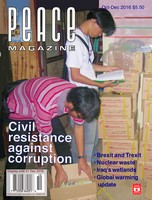
Peace Magazine Oct-Dec 2016, page 28. Some rights reserved.
Search for other articles by Rama Singh here
Ahmedabad, India: Navjivan Press, 2015, 140pp.
The twentieth century was a conveyor belt of progress. The good times rolled, but now they seem to be stopping. Liberty and freedom have turned into idleness and unemployment. Local communities are shaking loose and coming unglued. With globalization, wholesalers are moving in and local centers of agribusiness are on the way out.
There are two ways to think about this social change. One way is based on the pessimistic assumption that urbanization will eventually swallow up villages and rural communities forcing everybody off the family farm and into job-hunting. Corporate farming will take over and control the supply of food. This line of thinking leads to concerns about food insecurity, long distance transportation, energy costs, loss of food crop diversity, degradation of environment, and poor food quality.
The second line of thinking is based on the hope that corporate globalization will finally collapse, unable to continue because of growth-driven damage to the environment. Communities will pick up the pieces and relearn how to grow food, how to become inter-connected and self-reliant again.
The second view is advanced by a recent book, Anubandh: Building Hundred-Mile Communities, by Ela Bhatt, founder of SEWA (Self-Employed Women’s Association) and a Member of United Nations’ group of Elders. Hundred miles is her metaphor for the local, which Gandhi had in mind in his concept of village swaraj (self-rule) and local governance by panchayat (village councils). People do not need charity; they need the means to build thriving communities.
Ela Bhatt has helped millions of poor women in India become self-employed. She has accepted Gandhi’s ideal— the value of simplicity—all her life. “Anubandh” means inter-connectedness and mutual bond. Ela notes that we do not eat the food we produce and do not produce the food we eat. Poverty, she says, is a form of violence with the consent of society. Development is about restoring the balance between people and nature.
_Anubandh _suggests that inter-dependent initiatives solve local developmental problems and give meaning and dignity to life. This policy is the result of a comparative study of ten rich and poor villages carried out in ten districts of Gujarat, but it captures the experience of a lifetime. It addresses the problems that the poor face everywhere.
From California to Ethiopia to India, severe droughts are causing havoc and death. When we speak of climate change, there is no such thing as local; what happens elsewhere can also happen here. We have outsourced our daily bread, we live on food grown thousands of miles away.
Throughout history, when food has been scarce, power politics has prevailed over peace and food has become a weapon. Indian Prime Minister Indira Gandhi learned that the hard way when President Lyndon Johnson humiliated her and refused to supply food when India was starving in the 1960s. M. S.
Swaminathan, the father of the Indian green revolution, says Johnson’s act prompted Mrs. Gandhi’s resolve to ignite the green revolution.
My own city, Hamilton, has a Food Charter and the city staff is developing a food strategy and an urban farm. Citizens are doing amazing work. Neighbour to Neighbour, the Hamilton Community Garden’s Network, is a new community food centre, The Mustard Seed Food Co-operative, Hamilton Foodshare and other groups, are doing their part to sustain food security.
I can think of two proposals to ignite community consciousness. One calls for setting aside a strip of land around public parks in all new housing developments. Small pieces of land can be made available for gardening—especially to those who do not have a backyard. Community gardens will keep people in the park as well as engaged in useful labor. Another initiative would be to convince local supermarkets to create an “island” in the green section featuring local Canadian produce. Many people will buy local, even if it costs a few pennies more.
People formerly ate what they grew or collected near home. Until recently, with exception of fancy fruits, most of the world lived on produce that came from within 50 miles. Now even the staples travel long distances. The security of our daily bread demands new thinking about what we eat and where it comes from.
Reviewed by Rama Singh, a professor of biology, McMaster University and a founder of Gandhi Peace Festival.
Ela Bhatt was awarded the Padma Shri and Padma Bhusan by the Government of India and recently the Indira Gandhi Prize for Peace, Disarmament, and Development.

Peace Magazine Oct-Dec 2016, page 28. Some rights reserved.
Search for other articles by Rama Singh here